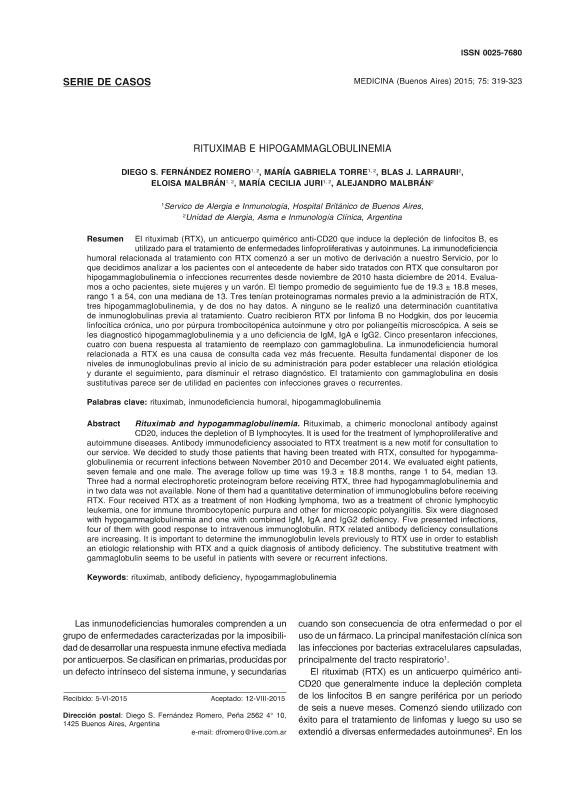Artículo
El rituximab (RTX), un anticuerpo quimérico anti-CD20 que induce la depleción de linfocitos B, es utilizado para el tratamiento de enfermedades linfoproliferativas y autoinmunes. La inmunodeficiencia humoral relacionada al tratamiento con RTX comenzó a ser un motivo de derivación a nuestro Servicio, por lo que decidimos analizar a los pacientes con el antecedente de haber sido tratados con RTX que consultaron por hipogammaglobulinemia o infecciones recurrentes desde noviembre de 2010 hasta diciembre de 2014. Evaluamos a ocho pacientes, siete mujeres y un varón. El tiempo promedio de seguimiento fue de 19.3 ± 18.8 meses, rango 1 a 54, con una mediana de 13. Tres tenían proteinogramas normales previo a la administración de RTX, tres hipogammaglobulinemia, y de dos no hay datos. A ninguno se le realizó una determinación cuantitativa de inmunoglobulinas previa al tratamiento. Cuatro recibieron RTX por linfoma B no Hodgkin, dos por leucemia linfocítica crónica, uno por púrpura trombocitopénica autoinmune y otro por poliangeítis microscópica. A seis se les diagnosticó hipogammaglobulinemia y a uno deficiencia de IgM, IgA e IgG2. Cinco presentaron infecciones, cuatro con buena respuesta al tratamiento de reemplazo con gammaglobulina. La inmunodeficiencia humoral relacionada a RTX es una causa de consulta cada vez más frecuente. Resulta fundamental disponer de los niveles de inmunoglobulinas previo al inicio de su administración para poder establecer una relación etiológica y durante el seguimiento, para disminuir el retraso diagnóstico. El tratamiento con gammaglobulina en dosis sustitutivas parece ser de utilidad en pacientes con infecciones graves o recurrentes. Rituximab, a chimeric monoclonal antibody against CD20, induces the depletion of B lymphocytes. It is used for the treatment of lymphoproliferative and autoimmune diseases. Antibody immunodeficiency associated to RTX treatment is a new motif for consultation to our service. We decided to study those patients that having been treated with RTX, consulted for hypogammaglobulinemia or recurrent infections between November 2010 and December 2014. We evaluated eight patients, seven female and one male. The average follow up time was 19.3 ± 18.8 months, range 1 to 54, median 13. Three had a normal electrophoretic proteinogram before receiving RTX, three had hypogammaglobulinemia and in two data was not available. None of them had a quantitative determination of immunoglobulins before receiving RTX. Four received RTX as a treatment of non Hodking lymphoma, two as a treatment of chronic lymphocytic leukemia, one for immune thrombocytopenic purpura and other for microscopic polyangiitis. Six were diagnosed with hypogammaglobulinemia and one with combined IgM, IgA and IgG2 deficiency. Five presented infections, four of them with good response to intravenous immunoglobulin. RTX related antibody deficiency consultations are increasing. It is important to determine the immunoglobulin levels previously to RTX use in order to establish an etiologic relationship with RTX and a quick diagnosis of antibody deficiency. The substitutive treatment with gammaglobulin seems to be useful in patients with severe or recurrent infections.
Rituximab e hipogammaglobulinemia
Título:
Rituximab and hypogammaglobulinemia
Fernández Romero, Diego S.; Torre, María Gabriela; Larrauri, Blas J.; Malbran, Eloisa; Juri, María Cristina; Malbrán, Alejandro

Fecha de publicación:
10/2015
Editorial:
Medicina (Buenos Aires)
Revista:
Medicina (Buenos Aires)
ISSN:
0025-7680
e-ISSN:
1669-9106
Idioma:
Español
Tipo de recurso:
Artículo publicado
Clasificación temática:
Resumen
Palabras clave:
Rituximab
,
Hypogammaglobulinemia
,
Linfocitos B
Archivos asociados
Licencia
Identificadores
Colecciones
Articulos(SEDE CENTRAL)
Articulos de SEDE CENTRAL
Articulos de SEDE CENTRAL
Citación
Fernández Romero, Diego S.; Torre, María Gabriela; Larrauri, Blas J.; Malbran, Eloisa; Juri, María Cristina; et al.; Rituximab e hipogammaglobulinemia; Medicina (Buenos Aires); Medicina (Buenos Aires); 75; 5; 10-2015; 319-323
Compartir



